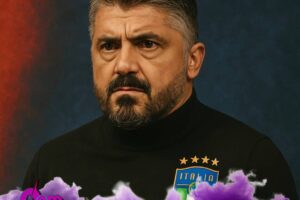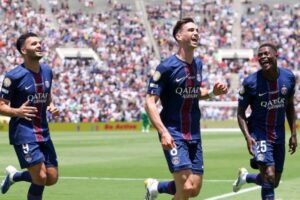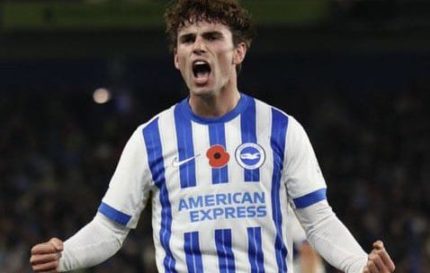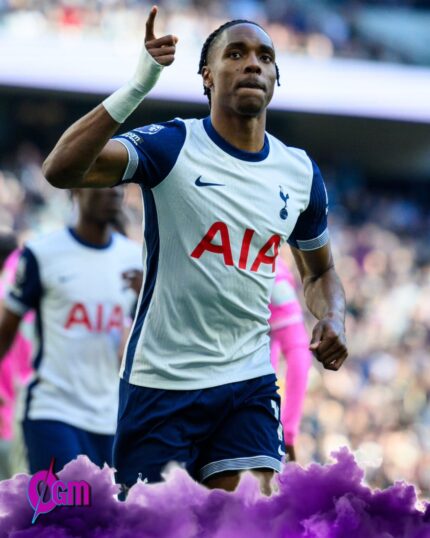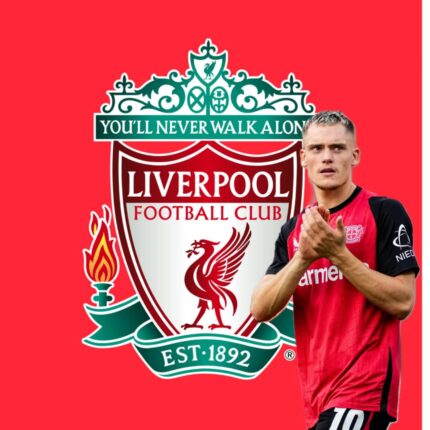In the early moments, Brighton’s and Hove Albion aimed to establish control, with Georginio Rutter winning a crucial free kick in the attacking half at the 7-minute mark. However, this advantage quickly shifted as Manchester City countered with heightened pressure. Brighton’s aggressive style showed promise but led to frequent fouls, most notably Rutter’s foul on Rico Lewis in the 10th minute, disrupting Brighton’s attacking momentum.
Despite the strategic fouls aimed at slowing City down, Brighton’s discipline slipped, resulting in further setbacks. Yasin Ayari, who had an early offside call at the 12-minute mark, received a yellow card for a rough foul on Phil Foden in the 19th minute. These fouls impacted Brighton’s rhythm, especially with Manchester City taking advantage of the situation to maintain control over the game.
Manchester City’s Persistent Attacks Pay Off
Manchester City capitalized on set-piece opportunities to sustain pressure on Brighton’s defense, with multiple attempts to break through their back line. At 15 minutes, Savinho’s left-footed shot tested Bart Verbruggen’s skills, which he saved, but the team continued pressing. Erling Haaland, assisted by Phil Foden, came close to scoring from a set piece just two minutes later, but his shot veered wide.
Finally, in the 23rd minute, Manchester City’s relentless offensive efforts bore fruit. Following a quick break, Erling Haaland netted a powerful shot from close range, giving City the lead. This goal underscored City’s strategy of calculated aggression and tactical pressing, showcasing Haaland’s skill in seizing scoring opportunities. With City in control, Brighton’s defenders faced continued challenges as they attempted to regain their footing.
Haaland’s Near Misses Highlight Brighton’s Defensive Grit
Brighton’s defense remained under relentless siege, with Erling Haaland posing a constant threat. At the 26-minute mark, Haaland’s right-footed attempt from a tight angle forced Verbruggen into another save. The subsequent corner kept the pressure high, but Haaland’s header from close range missed the target. City’s repeated corner opportunities reflected Brighton’s defensive resilience, as they managed to deflect several shots.
While Brighton’s defenders held firm against Haaland’s efforts, they struggled to counter City’s organized offense. The Manchester City frontline, with Haaland leading the charge, showcased their well-coordinated attacks, which kept Brighton on edge and disrupted their attempts to counterattack effectively.
Brighton’s Limited Chances and Foul Trouble
Brighton found rare opportunities to retaliate but struggled to convert them into goals. In the 35th minute, Danny Welbeck’s shot from the center of the box was blocked, and Pervis Estupiñán’s follow-up attempt missed the target, underlining Brighton’s difficulties in breaking down City’s defense. Welbeck’s close-range free kick in the 39th minute also went wide, symbolizing Brighton’s inability to capitalize on brief offensive spells.
Compounding their challenges, Brighton’s defensive unit continued accumulating fouls, with Igor Julio receiving a yellow card in the 44th minute for fouling Haaland. This foul trend hindered Brighton ability to establish fluid gameplay and limited their control over the midfield. As the half concluded, Manchester City maintained a 1-0 lead, thanks to Haaland’s strike, and entered halftime with the psychological and strategic advantage.
Brighton’s Tactical Changes in the Second Half
Brighton started the second half trailing by a goal, but manager Roberto De Zerbi made a bold decision, opting to bring on Carlos Baleba for Yasin Ayari at the break. This substitution aimed to strengthen the midfield, giving Brighton more control over the game’s tempo and allowing them to transition faster from defense to attack. Baleba quickly made his presence felt, assisting in the link-up play with Pervis Estupiñán and helping Brighton launch more coordinated attacks as they pressed for an equalizer.
As the game progressed, De Zerbi continued to adapt, making several key substitutions that would eventually tilt the match in Brighton’s favor. Notably, Jack Hinshelwood was forced off due to injury, replaced by Matt O’Riley in the 57th minute. This change proved vital as O’Riley later played a crucial role in Brighton’s offensive success, contributing to the game’s momentum shift and later scoring the winning goal.
Manchester City’s Defensive Struggles Under Pressure
Manchester City initially held firm defensively, absorbing Brighton’s relentless pressure early in the second half. Savinho and Rico Lewis put in solid efforts, winning crucial free kicks and disrupting Brighton flow. However, as Brighton intensified their attacks, City’s backline began to show signs of vulnerability. Despite Kyle Walker and Josko Gvardiol’s attempts to keep Brighton’s forwards at bay, they struggled to deal with the increasing number of shots and set-piece plays created by Brighton’s attack-minded substitutions.
The 78th-minute equalizer from João Pedro underscored City’s defensive frailties. A precise pass from Jan Paul van Hecke allowed Pedro to penetrate the City defense and find the back of the net. City’s defense continued to falter as Brighton capitalized on the momentum, with Matt O’Riley netting the decisive goal in the 83rd minute, leaving City’s defense exposed and highlighting their struggles to maintain composure under sustained pressure.
Brighton Resurgence: Key Moments Leading to Victory
Brighton equalizer marked the turning point, sparking a surge in confidence that lifted both the players and the home crowd. João Pedro’s well-taken shot in the 78th minute was the result of persistent teamwork and strategic adjustments from De Zerbi. Assisted by van Hecke, Pedro’s goal exemplified Brighton’s resilience and determination to challenge City, who, until that point, had managed to stifle Brighton’s efforts in front of goal.
Only five minutes later, Brighton seized the opportunity to complete their comeback with Matt O’Riley scoring the match-winner. O’Riley’s left-footed strike from the center of the box capped off a thrilling rally that showcased Brighton depth and tactical flexibility. With his goal, O’Riley not only rewarded Brighton efforts but also sent a strong message about the team’s potential to overcome elite opponents like Manchester City.
Late Attempts by Manchester City to Salvage the Game
As the clock ticked down, Manchester City attempted to regain control, pushing forward in a desperate bid to equalize. Kevin De Bruyne and Phil Foden were key players in City’s efforts, creating scoring chances and pressing Brighton defense to its limits. In the 90th minute, City saw a glimmer of hope as the fourth official announced nine minutes of added time, giving them a final opportunity to salvage a point from the match.
Despite City’s intense pressure and several close attempts, including a header from Bernardo Silva that required a top save from Brighton’s goalkeeper, the team failed to break through. As frustrations mounted, the game’s physicality escalated, resulting in yellow cards for both Erling Haaland and Jan Paul van Hecke in the final minutes. Ultimately, City’s inability to convert these late chances underscored the resilience of Brighton’s defense, sealing a hard-fought 2-1 victory for the home side.



